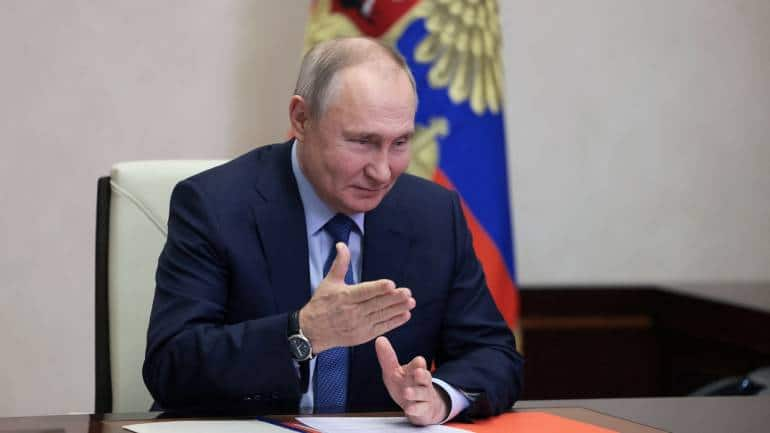
One year of Ukraine war: How West’s double standards, booming trade with India help Russia dodge sanctions

One year of Ukraine war: How West’s double standards, booming trade with India help Russia dodge sanctions
A year ago, Russia launched an invasion on Ukraine, describing it as a pre-emptive strike against the latter's bid to join the NATO military alliance. In response, the West slapped thousands of crippling sanctions against Moscow, targeting its political class, state-owned assets and business honchos or oligarchs.
The sanctions, which are backed by over 30 countries including the US, the UK, EU member states, Canada, Australia and others, resulted in a price cap on Russian crude exports, freezing of Russian Central Bank's overseas funds and removed the country's access to SWIFT global financial transactions system.
The sanctions have since kept multiplying, with the count crossing 11,800 this month, as tracked by Washington-based think-tank The Atlantic Council. However, they have failed to severely dent the Russian economy so far.
As per the numbers released by Russia's Federal State Statistics Service this week, which are largely in line with the assessment of the International Monetary Fund (IMF), the Russian economy declined by only 2.1 percent in 2022. On the contrary, the Ukrainian economy has tanked by 33 percent.
After the war had erupted last year, experts had claimed that Russia, being the world's most sanctioned state, will witness a negative growth in double digits. The US-based Institute of International Finance (IFF) had predicted a 15 percent fall in the Russian economy in 2022, and a 3 percent decline in 2023.
The IMF's latest forecast shows that Russia will register a positive economic growth of 0.3 percent this year, even as the war grinds on. This indicates that the western sanctions have failed to achieve their desired effect, as of now. Here's a look at the reasons.
Russian economy's resilience
Analysts say that the West, which has thrown its weight behind Ukraine, took cognisance of Russia's military prowess but "underestimated" the tenability of the latter's economy.
While the military generals of President Vladimir Putin may have not lived up to his expectation of running over swathes of Ukraine, his finance ministry has shown prudence in the wake of the ongoing economic warfare.
This is reflected in the inflation rate being restricted to 11.8 percent, as of January 2023. This is not only lower than the forecasts of 25-30 percent made after the war erupted, but also below the prevailing rate of inflation in several of the western economies.
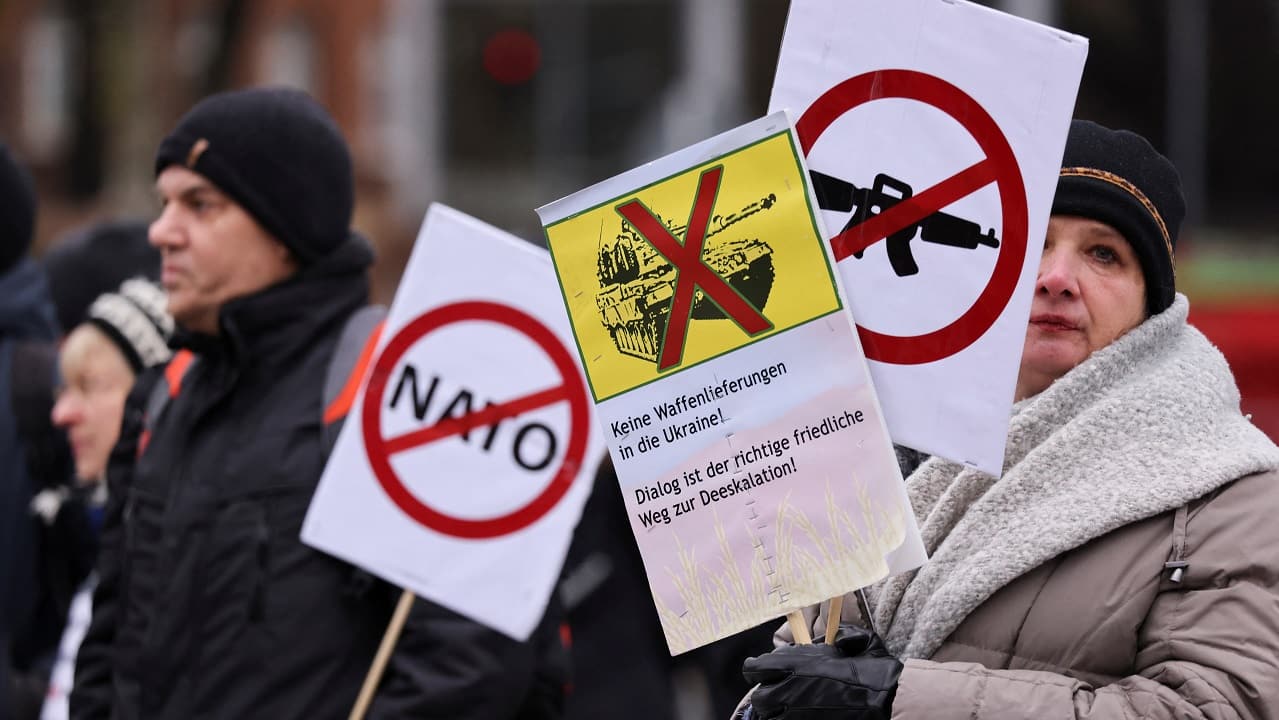 Pro-Russia demonstrators protest against sanctions and arms delivery, amid Russia's invasion of Ukraine, in Cologne, Germany, December 4, 2022 (Image: Reuters)
Pro-Russia demonstrators protest against sanctions and arms delivery, amid Russia's invasion of Ukraine, in Cologne, Germany, December 4, 2022 (Image: Reuters)
Similarly, the IIF had predicted exports to dip by 25 percent, and investments over the last 30 years to be "fully disintegrated". On the contrary, exports jumped 25.4 percent on-year to $431 billion, per the official data released for the first nine months of 2022; and foreign direct investments trimmed by just about 0.6 percent during the same period, according to CEIC Data.
"The sanctions have failed and the Russian economy has shown itself to be quite resilient. The West had a narrative that 'Russia is a petrol pump attached to a country'. That has proven to be completely untrue. It is not like Iraq, Syria or Lebanon which only produce oil and energy, and lack the capacity to strengthen their economies," said Anuradha Chenoy, Retired Professor, Centre for Russian Studies, Jawaharlal Nehru University (JNU), while speaking to Moneycontrol.
Russia's current account, which is the difference between all money coming into the country via investment, trade and transfers, and what flows out - peaked to a record high of $227.4 billion in 2022. This was 86 percent higher as compared to 2021.
While crude and gas accounted for the bulk of revenue earned through exports, Russia also made significant gains through the supplies of steel, uranium and fertiliser, among others, to countries in the Global South, experts said.
To maintain the momentum, Moscow needs to scale up its manufacturing in the non-oil category, they stressed, adding that the latest round of sanctions, including Europe's ban on the purchase of seaborne Russian crude and gas, is likely to slash the country's energy revenues through exports.
"When the Soviet Union disintegrated and Russia became a capitalist economy in the 1990s, a large number of their big factories were closed and western factories came in. But they still had these old ones which they are cranking up now. In this sense, many in Russia's economic circles are viewing the sanctions as a gift as the country's own industrialisation is likely to revive in a huge way in the next 2-3 years," Chenoy said.
Another factor that highlights the prudency of Russia's economic management is the resiliency shown by ruble. The Russian currency, which was valued at 70-75 against its American counterpart, had slipped to around 140 shortly after the sanctions were announced in February last year. Within a couple of months, however, it recovered to the pre-invasion levels, and currently, it hovers at around 75 per dollar-mark.
The durability of ruble is credited to several measures taken by Kremlin, such as hiking the interest rates to 20 percent as soon as the war erupted to disincentive the swapping of ruble for a dollar or euro. Similarly, measures such as banning Russian brokers from selling foreigner-owned securities and asking Russian businesses to swap 80 percent of overseas-earned revenue into rubles helped in shoring up the currency's value, economists explained.
The resilience of ruble is significant as the Russian currency was one of the prime targets of the sanctions. US President Joe Biden had last year claimed that the economic measures imposed against Moscow would "turn the ruble into rubble". However, his prediction has fallen flat.
The war with Ukraine and the ensuing sanctions have also not cast an acute adverse effect on the livelihood prospects of ordinary Russians, as the country's unemployment rate stood at a record low of 3.7 percent in December 2022, per the official data.
“If this is a crisis for Russia — which it is — it’s nothing like the turmoil of the early 1990s when the state, society and economy were all collapsing at the same time," Alexander Titov, a Russian emigre and lecturer at Queen’s University Belfast, stated in his column for the Conversation after recently returning to his homeland.
Imagine if all you knew about 2022 was this chart and someone asked you to explain what caused this. You might speculate that the price of Russia's exports had jumped a ton, but I doubt you'd think this is an economy under major sanctions. pic.twitter.com/O9cqQqrLGw— Gerard DiPippo (@gdp1985) January 16, 2023
Lack of conviction
One of the arguments behind the sanctions not achieving their intended results is the lack of conviction among countries that have decided to punish Kremlin.
The long rope given to Russia for crude exports, the inability to prevent economies like China, Turkey and India from trading with Moscow, and the indirect consumption of Russian oil -- after getting it processed through India -- are some of the loopholes in the western sanctions regime, experts point out.
"The West has never stated its aim, beyond a desire to curtail and punish the Kremlin. So, the confusion around the effectiveness of the sanctions comes from the lack of clarity about their goal," independent researcher and international affairs expert Sourish Ghosh told Moneycontrol.
"Not only India but other countries are engaged with Russia as well, and aimless sanctions could not do much," he added.
Analysts also point towards the case of Russian gas supplies, which were excluded from the sanctions regime due to Europe's heavy reliance on it. A year after the war, the continent continues to import gas from Moscow. According to the World Economic Forum, Russian gas accounted for 15.1 percent of Europe's total gas imports till the third quarter of 2022.
Similarly, the sanctions on Russian ships - which bar insurance companies to cover them - have affected the commodities and food supplies to the third world, but the West has left Russian titanium out of the sanctions regime as it is procured for the manufacturing of Airbus and other aircraft, Chenoy pointed out. "This exposes the West's double standards," she added.
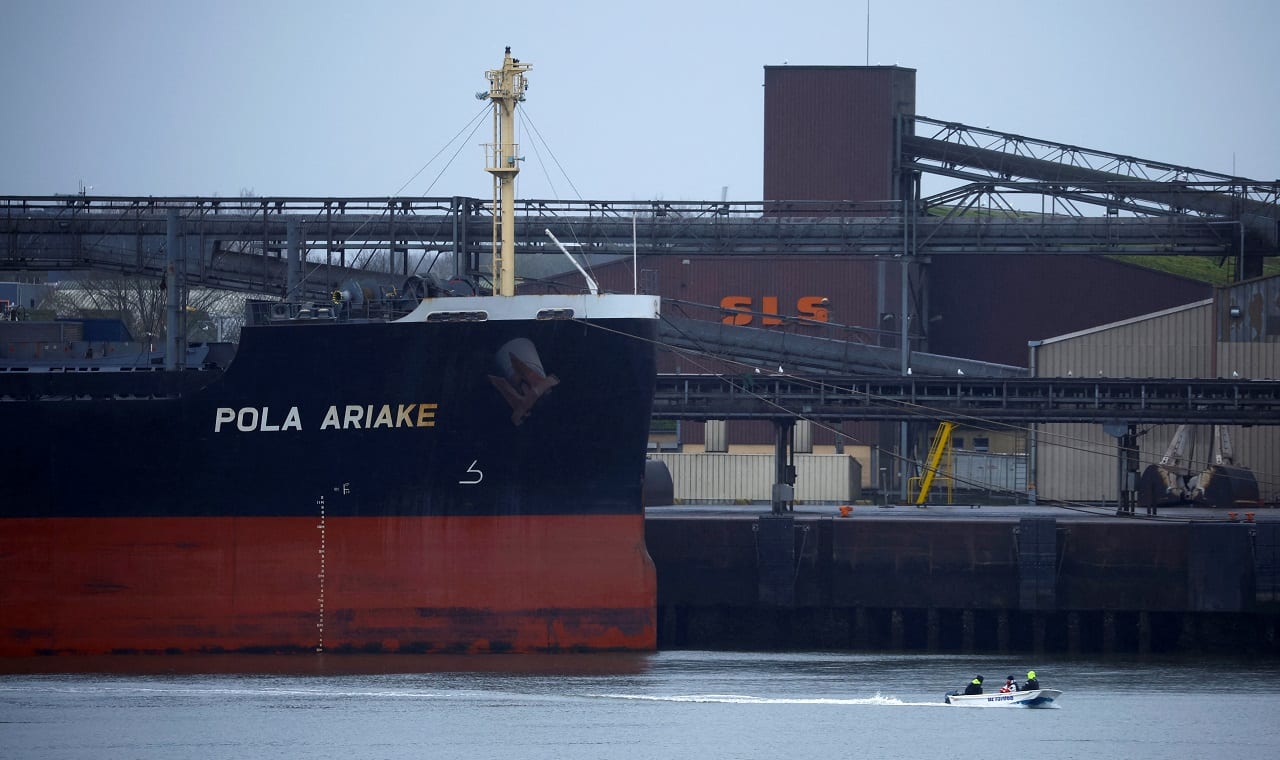 A view of the cargo ship Pola Ariake, which officials have linked to Russian ownership, seized by customs officials in the Port of Lorient, in France, following sanctions imposed against Russia (Reuters file image)
A view of the cargo ship Pola Ariake, which officials have linked to Russian ownership, seized by customs officials in the Port of Lorient, in France, following sanctions imposed against Russia (Reuters file image)
A report released by Yale University on February 12 shows several foreign companies, including western firms, continue to operate in Russia, even a year after the war. Out of the 374 major firms that operating, 210 are “digging in” and “just continuing business as usual in Russia", it said.
This includes Austria’s Raiffeisen Bank International and Italy’s UniCredit. A Reuters report on February 12 claimed that both of them are also offering loan payment holidays to Russian soldiers, on the orders of the government.
Booming trade with India
India has not shied away from increasing the bilateral trade with Russia in the aftermath of war. The trade volume between the two countries jumped five-fold to $37 billion from April-January, making Moscow the fourth biggest trading partner of New Delhi, as per the data shared by the Indian commerce ministry on February 15.
The trade has been driven by crude oil imports, which jumped 33 times on-year by December to 1.2 million barrels per day, as per the data shared by energy cargo tracker Vortexa. Russian imports have overtaken the oil bought from Saudi Arabia and Iraq, which stood at 748,000 bpd and 886,000 bpd during the month, respectively, the data showed.
Between April and October, Russian fertiliser imports also jumped to a record high of 2.15 million tonnes, which is 371 percent higher than the year-ago period, Reuters learnt from a senior government official. Similarly, Russian steel imports climbed by 468 percent on-year to 218,000 tonnes, between April and November, the news agency further reported.
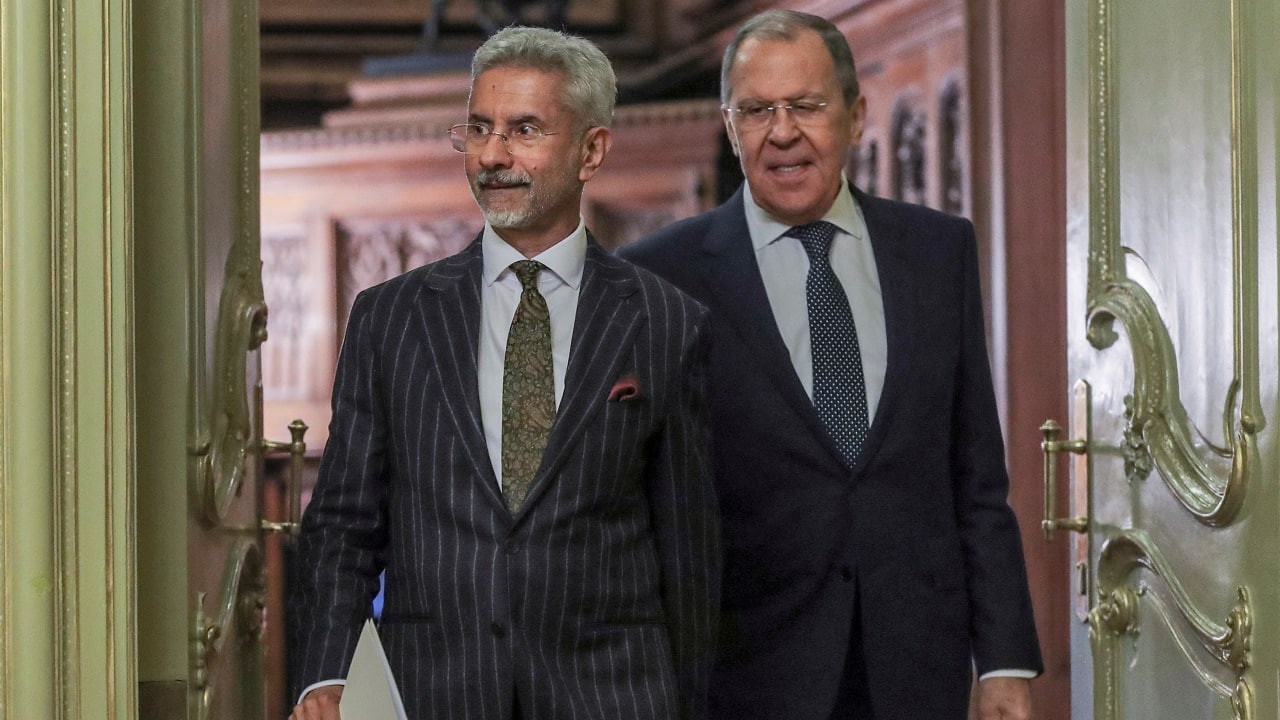 Russian Foreign Minister Sergei Lavrov and his Indian counterpart Subrahmanyam Jaishankar, in Moscow, Russia on November 8, 2022 (Image: Reuters)
Russian Foreign Minister Sergei Lavrov and his Indian counterpart Subrahmanyam Jaishankar, in Moscow, Russia on November 8, 2022 (Image: Reuters)
Has the growing trade with India allowed Russia to blunt the impact of sanctions? Experts agree to some extent, calling it one of the factors that have helped Moscow.
"It is amongst those things that have allowed Russia to offset the impact of sanctions. It has helped their economy. But it has also helped India due to the discounted price," Chenoy said. "India's position is the Global South's position. 130 countries have adopted strategic neutrality, so it means something," the former JNU professor added.
Russia has not only shored up its revenue by increasing the crude sale to New Delhi -- though at a heavily discounted price -- it is also finding an indirect supply route to the West via India.
According to Bloomberg, India, now the biggest importer of Russian crude, shipped about 89,000 barrels a day of diesel and gasoline to New York in January 2023. This was the highest in nearly four years. Similarly, the country's flow of daily low-sulfur diesel to Europe stood at 172,000 barrels last month, which was the highest since October 2021.
Apart from India, China has also increased its bilateral trade with Russia. The volume peaked to a record high of $190 billion in 2022, Chinese customs data showed.
"Both China and India are important players in the world system and when both players are indirectly backing Russia, then it is evident that the Kremlin has managed to survive," Ghosh said, further suggesting that a bulk of countries in the Global South do not want to alienate themselves from Moscow.
What lies in store?
Although the western sanctions have fallen short of wrecking the Russian economy so far, they may have a lethal effect in the long run, particularly after the West completely shifts away from its reliance on Russian energy, analysts say.
Russia will increasingly face isolation due to "secondary sanctions", which are being used by the US and its allies to deter non-aligned countries from trading with Moscow, they point out.
The latest to face the threat of the West's secondary sanctions was Bangladesh, which was forced to turn away Russian ships from its shores on February 21 after the US and EU issued a warning.
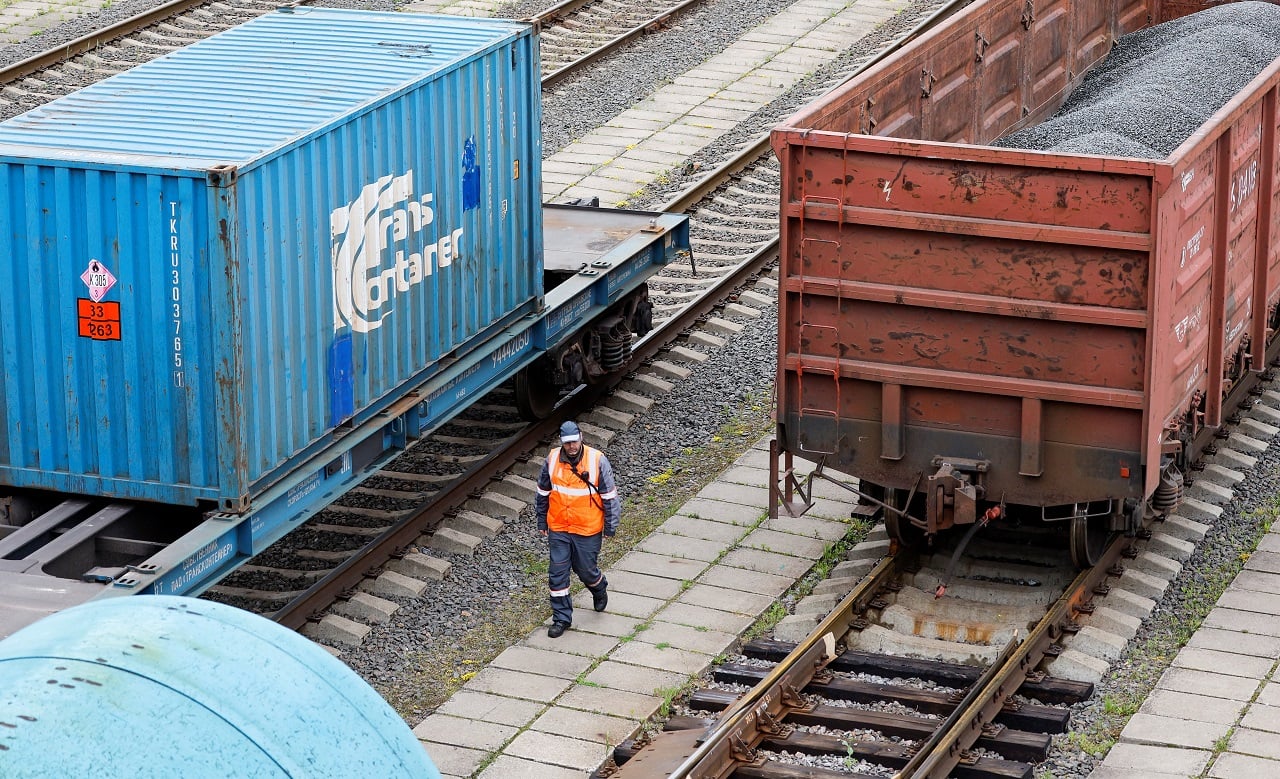 A railway employee walks near freight cars, following Lithuania's ban of the transit of goods under EU sanctions through the Russian exclave of Kaliningrad on the Baltic Sea, in June last year (Image: Reuters)
A railway employee walks near freight cars, following Lithuania's ban of the transit of goods under EU sanctions through the Russian exclave of Kaliningrad on the Baltic Sea, in June last year (Image: Reuters)
On February 5, US Undersecretary of Treasury Brian Nelson warned Turkish businesses and banks of "sanctions and a potential loss of access to G7 markets" if they continued to engage with sanctioned Russian entities.
"They have kept several agreements with Indian banks on hold due to the secondary sanctions. India had given the permission to open VOSTRO accounts that would have enabled rupee-ruble trade. But that has been put on hold precisely due to the fear of secondary sanctions on the banks," Chenoy said.
This isolation will eventually hit several sectors of the Russian economy, including the pharmaceuticals and consumer industry, she noted.
The sanctions are expected to be a long-drawn event, as both sides had indicated at continuing the war for long period. While the Russian economy has shown resilience to a year of sanctions, only time will tell whether it can hold its ground for the years to come.
The outlook is grim, with Bloomberg Economics predicting a wipeout of a massive $190 billion in Russia's gross domestic product by 2026 if the war with Ukraine, and the ensuing sanctions, continue. That would reduce the size of Russian economy to that of way smaller countries like Kuwait or Hungary, it said.